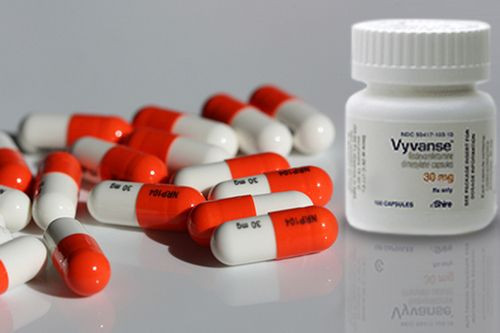Binge-Eating Disorder Drug: Vyvanse, Controversial ADHD Medication, Approved by FDA

Faced with a continual struggle and a deep sense of not being in control, binge-eaters trying to recover normal eating habits can find it a Herculean task in a world where grocery stores have entire aisles devoted to junk food and freezers filled with ice cream, where snacks blanket the tables at most social gathering.s The temptation and the option to binge are everywhere.
Now a company claims it has a miracle drug to fight the little-known disorder. Last month, the Food and Drug Administration approved Vyvanse -- originally marketed as an attention deficit hyperactivity disorder drug -- to treat BED, calling it “an effective option to help curb episodes of binge-eating.” The company that makes Vyvanse hailed the drug as a “milestone” in BED’s treatment. But specialists in the treatment of eating disorders weren’t so sure. BED is a complicated disorder, with too many causes and factors to be treated by a single drug, and both Vyvanse and Shire Pharmaceuticals, the drug’s manufacturer, have troubled histories that include illegal marketing and child suicides.
Melissa Hopper, a psychologist who is an expert in treating BED, said inherent in binge-eating is the sense of being out of control. “Binge-eating disorder is a complex,” she said, and the most effective ways of dealing with it are relearning behaviors, regulating emotions, and identifying triggers — which are done through therapy, not by taking pills. After all, one of the biggest challenges is the fact that humans have to eat – binge-eaters cannot quit cold turkey the way one might try to quit smoking. “You’re constantly faced with something very difficult,” Hopper said.
BED is the most common eating disorder in the United States. Estimates vary as to how many it affects, from 1.6 percent of women and .8 percent of men to up to 2 percent of American adults. BED is found across all races, ages and genders, although the disorder tends to be more prevalent among people trying to lose weight. Contrary to some popular perceptions, BED is an actual psychiatric disorder, found in the Diagnostic and Statistical Manual of Mental Disorders, Fifth Edition (DSM-V), the most recent version of the so-called psychiatrist’s bible.
“Having five things on the stove, grabbing cereal boxes, food everywhere… A lot of my patients, when they do binge, they describe it as a frenzy of activity,” Emily Rosenthal, a New York psychotherapist who specializes in treating eating disorders, said. Rosenthal described binge-eating as a unique coping behavior. “It’s harder than some other addictions to deal with,” she said. “There can be more denial, because you’re certainly not going to have a breathalyzer test with food. And it’s legal.” Rosenthal said patients with eating disorders often struggle with other issues, such as anxiety, depression or trauma.
In order to be diagnosed, a person has to have an episode of binge-eating at least once a week for three months. The DSM-V describes an episode as “eating, in a discrete period of time [usually two hours], an amount of food that is definitely larger than most people would eat in a similar period of time under similar circumstances.” Most importantly, the eating has to be out of control.
More so than other mental disorders, however, treatment for BED is strongly rooted in a variety of therapies, chief among them cognitive behavioral therapy (CBT), as well as intensive outpatient programs or nutrition counseling — not pharmacology. Patients might take medications for concurrent problems that could affect binge-eating such as by suppressing an appetite, but those drugs aren’t necessarily targeting the eating disorder itself. BED is unique, too, because of food’s ubiquity and its role in American culture. “Almost every cultural tradition we have has a food element to it,” said Hopper. “It’s so woven into our culture [that] it makes [treating BED] difficult.”
No One Knows Why It Works
Vyvanse was first approved in 2007 to treat attention deficit hyperactivity disorder, or ADHD, in children over the age of 6. It was approved to treat BED after being tested in two clinical trials, sponsored by Shire, the drug’s maker, in 724 people with moderate to severe versions of the disorder, the FDA stated. Those on Vyvanse binged fewer days each week than those taking placebos.
“We have no direct evidence about how Vyvanse works in BED,” Sandy Walsh, from the FDA office of media affairs, wrote in an email. “The exact mechanism of action of the drug in reducing the symptoms of BED is … unknown.”
In 2007, when it was first approved to treat ADHD, Vyvanse had sales of $97 million in the U.S. Some saw Shire’s decision to promote Vyvanse to treat ADHD as risky bet, but the drug did extremely well, becoming one of Shire’s star products. In 2013, Vyvanse sales were at $1.228 billion, up from $1.030 billion in 2012. The company’s 2013 annual report attributed this success to growth in the U.S. ADHD market as well as Vyvanse’s share of the market. Shire’s 2014 half-year report, the most recent available, showed Vyvanse sales of $710.7 million in the first six months of 2014, over $598.7 million during the same period of the previous year – growth of 19 percent – and a market share of 16 percent.
Shire had long been examining ways to recycle Vyvanse in other arenas. In 2011, Shire’s CEO said at the Reuters Health Summit that the company hoped to generate “multiple billions of dollars” from expanding Vyvnase use into new areas of illness, like schizophrenia, depression and binge-eating.
“Estimates suggest there are around 3 million patients with BED in the U.S.,” wrote Dr. Flemming Ornskov, Shire’s CEO, in his review in the 2014 annual report. “This is a huge unmet need with currently approved pharmacologic treatment.” Vyvanse’s active ingredient, lisdexamfetamine dimesylate, had “very real potential … to form the basis of treatment for Binge Eating Disorder,” he suggested.
Those who treat eating disorders, however, were skeptical that a pill could be the answer to a problem as complex as BED. “I just don’t want there to be the message that there’s a simple pill you can take. These are longstanding behavior patterns that need to be explored and shifted,” Melissa Gerson, clinical director of Columbus Park Collaborate, an outpatient treatment center in New York for people with eating disorders, said. Although the drug sounded promising, she said she would not recommend a drug alone to treat BED. If the problematic behaviors that cause BED are not addressed, “I can’t imagine how you would see any long-term improvements in the symptoms,” she said. Normalizing a patient’s eating habits first is essential, she explained.
Dr. Leslie Heinberg, director of behavioral services for the Bariatric and Metabolic Institute at Cleveland Clinic, cited the risk of abuse in prescribing a drug like Vyvanse to patients with the disorder but said, “It opens up a lot of possibilities for future studies to see how this drug works versus CBT or other drugs.”
Not For the Faint of Heart
In approving Vyvanse, the FDA listed several major side effects. The information wasn’t new, but Vyvanse could cause strokes or heart attack, psychotic symptoms or even sudden death for those with heart problems, it warned. Some of the most common side effects, based on 14,311 reports filed with FDA from 2004 to 2012, were insomnia, drug ineffective, decreased appetite, and aggression.

Even more serious is a suggested link between Vyvanse and suicides in children. Since Vyvanse’s approval to treat ADHD in 2007, the FDA received more than 130 reports about Vyvanse and suicide, with 37 of the Vyvanse takers who contemplated suicide being under the age of 10, one media outlet reported.
Asked by IBTimes for a response, the FDA said it did not confirm outside analyses of “adverse event data” — occurrences like the suicides — because there was no certainty that the drug itself had caused the event. Moreover, “FDA does not require that a causal relationship between a product and an event be proven,” Walsh, the FDA media officer, wrote in an email. “We do continue to monitor for serious adverse events, including suicidal thoughts and suicides.”
Vyvanse and its maker, Shire Pharmaceuticals, have come under legal fire. In 2014, Shire shelled out $56.6 million in a settlement for a case alleging that in promoting several of its drugs, including Vyvanse, it had violated the False Claims Act. The plaintiff was a whistleblower named Dr. Gerardo Torres, Shire’s vice president for research and development of the ADHD/CNS Business Unit. According to court records, he alleged that since 2001 or earlier, Shire had been “engaged in illegal marketing schemes” in order to increase drug sales, include those of Vyvanse. One of those schemes was to market Vyvanse for unapproved, off-label uses by falsely representing how safe Vyvanse was. Shire, Torres alleged, wrongly promoted Vyvanse as a drug that could not be abused, despite a study showing the opposite.
Still, Gerson, of Columbus Park Collaborative, did highlight at least one positive outcome of the drug’s approval. “It’s not given the attention that it deserves,” she said of BED, but now that a drug has been approved to treat it, it might attract more notice. “I think [the disorder] is finally coming to the forefront,” she said.
© Copyright IBTimes 2024. All rights reserved.





















